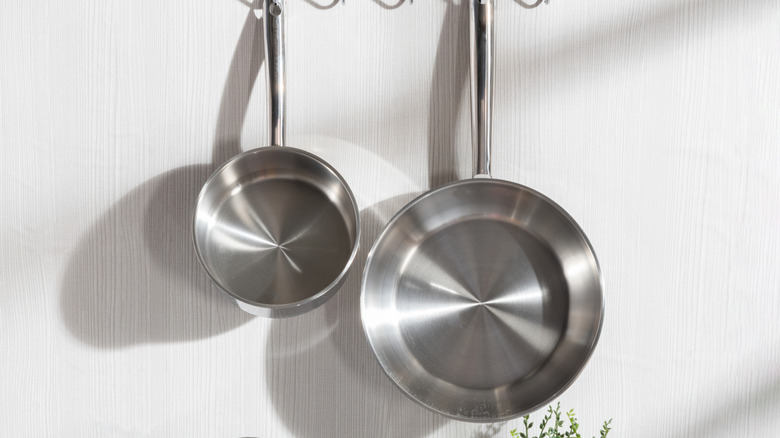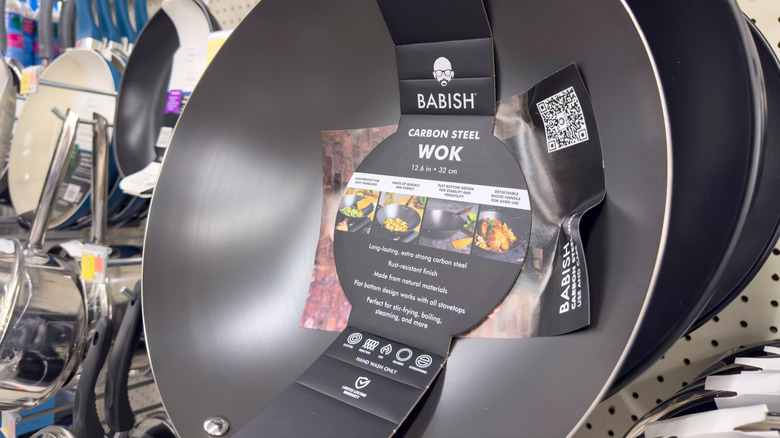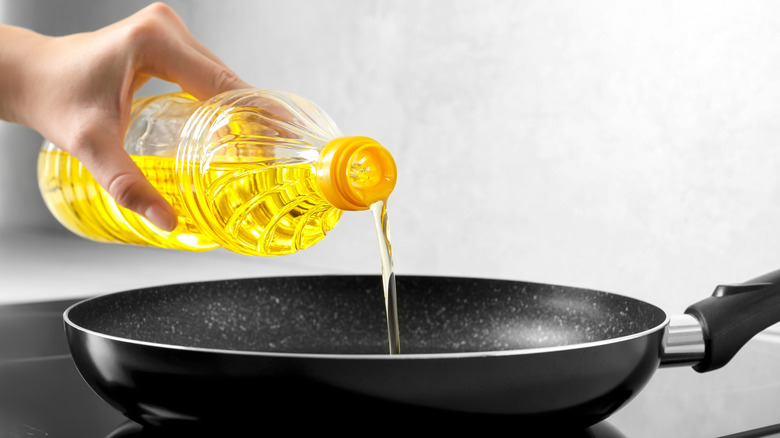Carbon Steel Pans Vs Stainless: The Differences You Need To Know
Admittedly undiscerning until now, I had always thought carbon steel and stainless steel were pretty much the same thing. Can you cook with it without your food getting stuck? Great, I'll take it. If you're on the same wavelength, then you also probably thought it didn't matter which one you grabbed from the cabinet. Turns out, there's a world of difference between these heavy hitters, and choosing the right cookware is paramount for the best cooking experience. Both carbon steel and stainless steel pans have strengths, weaknesses, and ideal uses, so understanding how they're made, how they cook, and how to care for them can help you decide which one to throw on the stove.
Think of it like this: There's a pan for those who love to sear perfect steaks and one for those who love flipping pancakes, and it's not always the same pan. Depending on the task at hand, the choice between carbon steel and stainless steel pans comes down to more than personal preference — performance also matters.
For the cliff notes, carbon steel pans are heavier, conduct heat better, and develop a nonstick patina over time when seasoned. Stainless steel pans are lighter, resistant to corrosion, hold heat well, and the upkeep is smoother overall. Both are durable, but carbon steel requires a bit more TLC. If you haven't yet, it's time to step back and analyze these two materials to see which might be the better fit for your cooking style.
Stainless steel pans vs carbon steel pans: How to cook with them
Despite the name, carbon steel pans are mostly composed of iron with a small percentage of carbon — it's the main reason they're tremendously durable yet still lightweight compared with cast iron. The cooking world loves these pans because of their versatility. You don't have to worry about your food sticking, and it cools down about as quickly as it heats up.
Stainless steel is made by combining iron and carbon with chromium and nickel, giving it a shiny, rust-resistant surface. It's worth noting that stainless steel doesn't require seasoning.
Carbon steel pans are fantastic for tasks that require extremely high heat and quick temperature adjustments, like stir-frying or searing meat. Stainless steel pans, meanwhile, excel at even heat distribution, making them great for tasks like browning large joints or simmering sauces without hotspots.
Both materials have their merits, but your cooking style will determine which one works best for you. If you love a pan that gets better with age, carbon steel is the way to go. If you prefer something maintenance-free, stainless steel might be the better choice.
Caring for your pans: Love them, and they'll love you back
Taking care of your pans is where the difference between carbon steel and stainless steel really shows. Carbon steel requires a bit more attention. Carbon steel pans need to be regularly seasoned — this involves heating oil on the surface to create a protective, non-stick layer. Without seasoning, carbon steel will eventually succumb to the elements (moisture and humidity) and start to rust.
After each use, it's best to clean carbon steel gently with hot water and a non-abrasive sponge, avoiding soap as much as possible. Use just a small amount if you absolutely need it. Dry it immediately to prevent rust, and add a light coat of oil for extra protection. Gently heat the oil on the stove then wipe clean with a dry kitchen towel.
Stainless steel, by contrast, is practically maintenance-free. You don't have to worry about seasoning or rust, and you can use dish soap without a second thought. However, food can stick to stainless steel if the pan isn't heated properly before cooking, so a little practice goes a long way. Stainless steel pans are also dishwasher safe, but handwashing is recommended to preserve their finish.
The choice between carbon steel and stainless steel comes down to how much effort you're willing to invest in maintenance and what you prioritize in performance. Both are excellent tools in the kitchen — if you treat them right, they'll last a lifetime.


